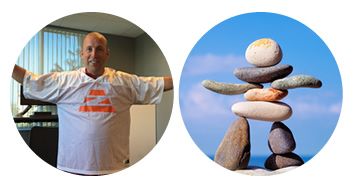Earlier this summer, I met a longtime friend for a cup of coffee. Tech executive, in his mid-40s, happily married, and killing it at work. By all measures, wildly successful. And yet, somehow, my friend suddenly found himself totally unsatisfied and feeling adrift. We talked about his quest to find more fulfillment in and out of work. How he struggles to find happiness in things that once brought him joy. And how he’s uncertain about what’s next.
 I might not have thought too much more about this, but 24 hours later, I found myself having the same exact conversation with another friend—almost identical profile, same technology-industry background. And, in the weeks since, I’ve found myself wondering: If we’re all so blessed, why are we so stressed? (A nod to Rebelution, one of my favorite bands and their hit song De-Stress)
I might not have thought too much more about this, but 24 hours later, I found myself having the same exact conversation with another friend—almost identical profile, same technology-industry background. And, in the weeks since, I’ve found myself wondering: If we’re all so blessed, why are we so stressed? (A nod to Rebelution, one of my favorite bands and their hit song De-Stress)
I don’t claim to have this whole career satisfaction thing figured out, but stress is something I spend a lot of time thinking about—personally and professionally. As the head of a 70-person technology company, I’m constantly thinking about what brings people satisfaction and causes others to burn out. And, more importantly, what they can do about it.
“The pressure to constantly evolve and to become more efficient is an incredible load to bear.”
Each of us have our own personal struggles—our own daily battles. It’s part of life. But, one constant in all of our lives is change. Technology is pushing companies and we all are asked to find additional “corporate efficiencies.” If you’re in the technology industry, chances are good that your job is very different today than it was just 12 months ago. The pressure to constantly evolve and to become more efficient is an incredible load to bear, but it’s also a gift. I still believe that technology is one of the best industries to work in.
Yet, maintaining a positive outlook in the face of adversity can be difficult. We are naturally conditioned to focus on the negative—we all submit to “external” pressures and factors that get us down. But deliberately setting your “internal” compass, regardless of what is going on around you, is the only answer. It’s better to be a thermostat than a thermometer. Plus, it is helpful to appreciate the ways in which adversity or life’s challenges can bring about good in your life. It has made a difference for me, and I’ve written a lot about the simple ways to train your brain to be happy.
Here are some examples of how I am attempting to combat stress in my own life:
I am practicing gratitude. I’ve found exercise, occasional yoga, and daily acts of gratitude to be impactful. I encourage you to try this easy gratitude exercise right now: Make a list of five people who matter to you and put it in your wallet. Look at it regularly and continually reflect on their positive attributes. Then try to be that person for someone else.
I am practicing empathy. For me, a huge part of combating stress is building personal connections with my coworkers and industry friends. But building authentic, deep personal connections in your career takes effort and requires empathy. And empathy is tricky; it’s often confused with sympathy. For example, it has been a realization for me that I don’t need to have all the answers, especially when it comes to my team members. I don’t need to fix everything. I just need to be there, listening and having empathy for what’s going on in their lives and career. I highly recommend this short video from Brené Brown on the difference between empathy and sympathy.
I find that putting the focus on others helps. Four years ago, we created Happyness Is A Choice, which was born out of a vision to redirect a portion of our customers’ purchases to non-profits and people in need. Since then, Zumasys has supported more than 400 individuals and organizations, given away close to $800,000 and made serving others and volunteering a priority in our lives. We are so grateful to everyone who is on this journey with us and look forward to all that is to come. In fact, we are celebrating Happyness Is A Choice with our latest fundraiser for Firm Foundations Romania (FFR). Learn more about this worthy group and how you can celebrate with us at www.zumasys.com/ffr.

I am watching my intake. Since becoming an entrepreneur, my life has seen periods of chronic headaches. Earlier this year, I was having them multiple times a week. They were so bad that I was prescribed medication. Three months ago, I participated in a food intake challenge at my gym. Today, I’m still endeavoring to (mostly) adhere to the guidelines—basically, less sugars and processed foods—and would you believe I haven’t taken a single prescription pill in 90 days? How often do you hear stories like this? What does it take for us to finally get the clue?
Controlling your intake also extends to what you’re feeding your mind. Personally, I am always rewarded when I read. Instead of looking at email, a smart phone or TV, read a book, a newspaper or some type of journalism that is new to you. I challenge you to spend 30 minutes a day reading something thought-provoking. As long as it is not on an electronic screen, I’m fairly certain it will enhance your output to the world. It will make you more interesting, provide much needed perspective and generally help you de-stress.
I submit to something greater than myself. This is a deeply personal choice. For some of my dearest friends in recent years, it means participating in formalized programs like AA. For others, it may be a daily yoga practice or meditation. For me, it’s a belief in a creator that is much greater than me and a master plan that transcends the broken people and problems of this world. If we would all just spend two hours each week, quietly reflecting and submitting to a higher power, how much less stress would there be in the world?
I embrace my responsibility as an entrepreneur. Business leaders and managers are in an extra-difficult position. People share their problems with you continually. They bring them in daily and lay them at your feet. And, if you’re not careful, those concerns can become your burden. As the leader of Zumasys, I feel the awesome responsibility of listening and supporting our team members and their families who rely on what we do for their livelihood. Some executives I know “cope” by hardening themselves or walling themselves off from this reality, but I have grown to truly enjoy the process and the responsibility.
 These may seem like little things. But what happens when you need a big change? What do you do when you’re stuck in a job that you don’t find fulfilling? Maybe you’re bored. Maybe you don’t feel valued. Maybe you are swimming in the wrong pond. No amount of dieting or downward dog will change how you feel.
These may seem like little things. But what happens when you need a big change? What do you do when you’re stuck in a job that you don’t find fulfilling? Maybe you’re bored. Maybe you don’t feel valued. Maybe you are swimming in the wrong pond. No amount of dieting or downward dog will change how you feel.
“No amount of dieting or downward dog
will change how you feel.”
Take a cue from my friend that I mentioned in the beginning of this story. I emailed him recently and received an ambiguous, extended out-of-office reply. It caused me to immediately call his cell. So what happened? After talking over his issue with his new boss, whom he respects greatly, my friend decided to take a couple of months off. He jettisoned a difficult customer that was raising his blood pressure, and he is heading out on a BMW touring bike to explore the beauty of the Rocky Mountains. He’s thrilled about what the break has done for him and he has an excitement in his voice that is truly infectious. After working for the same firm for nearly 20 years, he feels reinvigorated about coming back to work in a couple more weeks.
The story of my friend is not unique, especially in this economy and this unique time in our industry. I’m no happiness guru, but my success depends on my ability to understand, empathize and motivate a diverse group of people. And my advice to you is this: take a break if you need to. A sabbatical is always an option if you are a performer. Cut loose the haters in your life. In the words of Brené Brown —remember you’re not the “jackass whisperer”. Then create some simple daily habits that will bring you peace, purpose and fulfillment.
And remember, you’re too blessed to be stressed.

